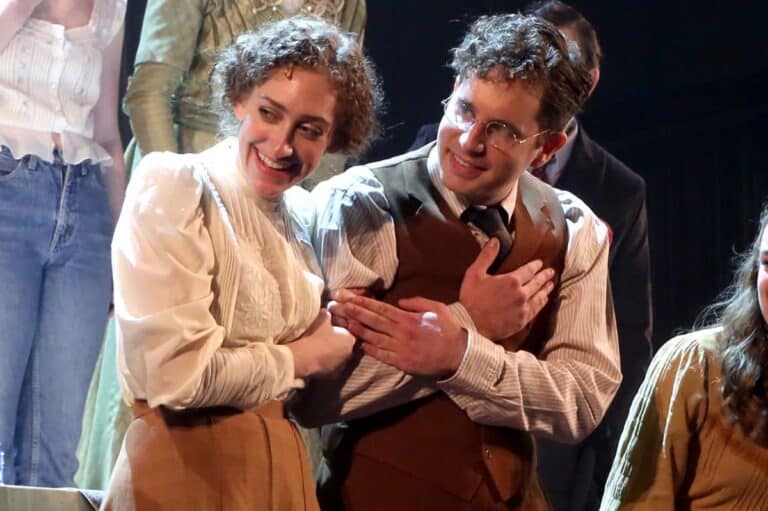
From composers like Stephen Sondheim, Richard Rodgers and Oscar Hammerstein II, to actors such as Ben Platt and Idina Menzel, Jewish talent has been instrumental in shaping Broadway’s rich history.
This year’s Tony Awards on June 11 recognized this impact, awarding the Best Revival of a Musical to “Parade” and Best Play to “Leopoldstadt” — both shows exploring themes of antisemitism.
The award ceremony also featured show-stopping performances by Ben Platt and Micaela Diamond as Leo and Lucille Frank, singing “This Is Not Over Yet” from “Parade,” and Lea Michele as Fanny Brice, singing “Don’t Rain on My Parade” from “Funny Girl.”
Yet, how many Jewish characters can you recall from your favorite Broadway shows? On the heels of the Tony Awards, we’re highlighting 10 iconic Jewish characters who have left indelible marks on the Broadway stage. Let’s dive into their stories and explore why they still matter today.
1. Fanny Brice from “Funny Girl” (1964)
“Funny Girl” brings to life the story of Fanny Brice, a Jewish comedian, singer and actress, who built her career on her Yiddish accent and knack for parody.
Brice, the daughter of Jewish immigrants from New York’s Lower East Side, remains unapologetically herself, charming audiences with her vibrant personality rather than her looks.
While set in the aftermath of World War I, the narrative often rewinds to Brice’s life before the war, highlighting her journey to success despite numerous obstacles.
Why it matters: Fanny Brice is known as a pioneer of funny, intelligent, and proudly Jewish leading ladies on Broadway.
Barbra Streisand starred in the original Broadway musical. Beanie Feldstein, who portrayed Brice in the Broadway revival and is Jonah Hill’s sister, stated: “I truly believe that any Jewish woman who wants to be funny and perform and sing owes something to Fanny Brice.”
2. Tevye from “Fiddler on the Roof” (1964)
It’s impossible to discuss Jewish characters in musicals without thinking of the quintessentially Jewish musical, “Fiddler on the Roof.”
Based on Sholem Aleichem’s “Tevye the Dairyman,” this beloved musical tells the story of Tevye and his family living in the Ukrainian village of Anatevka.
Tevye embodies the perfect example of a religious patriarch. His world revolves around his family and tradition, and he maintains his sense of humor despite life’s ups and downs.
Why it matters: Tevye’s tale hearkens back to Jewish tradition and heritage, bringing to life the world of the shtetls. It also serves as a reminder of the historic persecution Jews faced, as the family is ultimately forced to flee the village.
“Fiddler on the Roof” connects many Jewish communities with their roots through its traditional Yiddish music, humor and heart.
As Maureen Kendler wrote in the Jewish Chronicle: “The shtetl has a very special place in the Jewish heart, as a place of identity and origin… Anatevka, the shtetl in Fiddler on the Roof, was its best-known fictional creation.”
3. Herr Schultz from “Cabaret” (1966)
In the world of “Cabaret,” Herr Schultz, a kind and elderly fruit shop owner, steals hearts with his poignant love story. Schultz resides in a boarding house owned by Fraulein Schneider, and the pair are soon engaged.
However, the harsh realities of their time come crashing down when Schneider, a German, breaks off the engagement, fearing the dangers of marrying a Jew amid the rise of the Nazis.
Why it matters: Although “Cabaret” is set in Germany during the early days of the Nazis’ rise to power (1929-1930), the story does not centrally focus on the Jewish experience.
However, Herr Schultz’s presence serves as a crucial reminder of the Jewish people’s experience during that period.
As Lauren Stock asserted in The Wesleyan Argus, “Cabaret should be dedicated to Herr Schultz and the Jewish people. The Holocaust was fueled by antisemitism and a passionate hatred for Jews. Herr Schultz’s experience is central to the power of ‘Cabaret’ and his struggles are imperative to our understanding of antisemitism today.”
4. Paul from “Company” (1970)
Paul, a Jewish character from Stephen Sondheim’s celebrated musical “Company,” provides a rare glimpse into interfaith relationships on Broadway.
The song “Getting Married Today” shows his fiancée Amy getting cold feet on the day of their Catholic-Jewish wedding. Amy says: “Whoever would have thought I’d marry someone Jewish? Jewish! I mean, I didn’t even know anybody who was Jewish. That was probably my main attraction.”
Why it matters: Stephen Sondheim, widely revered as one of the most impactful composers in musical theater, is himself Jewish. However, he rarely incorporated explicit Jewish themes in his work.
Despite this, Sondheim characterized his Jewish identity as “very deep,” saying in an interview, “It’s the fact that so many of the people I admire in the arts are Jewish. And art is as close to a religion as I have.”
He also portrayed his upbringing as inherently Jewish, albeit not in a religious sense: “I grew up thinking the Jews were the world. Everybody was just Jewish. I went to summer camps where everyone was named Nussbaum.”
5. Marvin from “Falsettos” (1992)
In the intriguingly dysfunctional world of “Falsettos,” Marvin stands out as one of the many captivating Jewish characters.
The opening number, “Four Jews in a Room Bitching,” humorously mirrors a typical dynamic in many Jewish households and introduces the audience to the unique world of Marvin, who leaves his wife Trina for a man named Whizzer. The second act of the play centers on Marvin’s son, Jason’s bar mitzvah.
Why it matters: Marvin and Whizzer’s story explores not only Jewish identity but also queer identity during the ‘70s, highlighting the intersectional struggle and culture that arise from these identities.
While “Falsettos” has been well received over the years, its 2019 West End Revival stirred controversy over “Jewface” — a term referring to the inauthentic portrayal of Jewish characters by non-Jewish actors.
Despite its Jewish writers, the revival involved a non-Jewish team and cast, sparking criticism of a lack of cultural sensitivity and appropriation of Jewish culture and religion.
6. Leo Frank from “Parade” (1998)
“Parade,” a compelling musical by Jason Robert Brown, narrates the true story of Jewish American Leo Frank.
In 1913, Frank was wrongfully convicted for the murder of a 13-year-old girl, an incident that triggered severe antisemitism and shook the newly-established community of Jewish immigrants in Atlanta. It also galvanized the formation of the Anti-Defamation League.
Why it matters: “Parade” serves as a stark reminder of the dangers of rampant antisemitism. This message rang particularly true during the first performance of the 2023 Broadway revival when fierce antisemitic protesters gathered outside the theater.
Ben Platt, who played Leo Frank in the revival, encouraged viewers to learn about the story and to watch the show, saying on Instagram: “It was definitely very ugly and scary but a wonderful reminder of why we’re telling this particular story and how special and powerful art and, particularly, theater can be.”
The producers echoed this sentiment, telling People Magazine that the hostility “should put any remaining doubt to rest about the urgency of telling this story in this moment in history.”
7. Tateh from “Ragtime” (1998)
“Ragtime” explores the lives of a wealthy white couple, an African American ragtime musician, and a Jewish immigrant named Tateh and his daughter, set against the backdrop of early 20th-century America.
Tateh, a Latvian immigrant, initially struggles to make ends meet as a silhouette artist. However, he perseveres and eventually achieves success as a silent filmmaker, reinventing himself as “the Baron Ashkenazy.”
Why it matters: This story explores the multifaceted idea of the American Dream through different perspectives of those experiencing life in America, including a Jewish immigrant (learn more about the Jewish immigrant experience in the U.S.).
Tateh’s journey from a struggling immigrant artist to a successful filmmaker embodies the struggle and perseverance that often characterizes the immigrant experience.
Jules Becker of Greater Boston’s Jewish Journal noted that “Ragtime” resonates powerfully in contemporary times, highlighting the continuous battles against prejudices faced by Jews, African-Americans, and immigrants. The show “brings timely immediacy to its haunting message of hope and understanding in the face of hate,” Becker wrote.
8. Jared Kleinman from “Dear Evan Hansen” (2016)
In the critically-acclaimed musical “Dear Evan Hansen” — co-written by Jewish composer Benj Pasek — Jared Kleinman, Evan’s family friend known for his sarcasm, casually mentions his Jewish heritage throughout the show.
Although Jared’s Jewishness is not the main focus of his character, he talks about celebrating Rosh Hashanah and attending a Jewish summer camp.
Why it matters: While Jared’s Jewish character may not be as explicit as others on this list, his presence in a contemporary musical phenomenon like “Dear Evan Hansen” is significant.
Zachary Noah Piser, an Asian-American Jewish actor who recently portrayed Evan on Broadway, noted that the show isn’t a show about being Jewish, but that it “makes room to include the Jewish community”:
“The character of Jared Kleinman talks about going to camp, presumably a Jewish camp, and hooking up with a girl from Israel. He talks about bar mitzvah money, Rosh Hashanah…So I don’t think [“Dear Evan Hansen”] is about that, but I think the exciting thing is that it doesn’t exclude [Jewishness].”
9. Dina from “The Band’s Visit” (2017)
Dina is the charismatic owner of a café in Beit Hatikva, a fictional town in the Negev. Her life takes an unexpected turn when a band of Egyptian musicians, the Alexandria Ceremonial Police Orchestra, mistakenly arrive in Beit Hatikva instead of their intended destination, Petah Tikvah.
Displaying warm hospitality, Dina offers the lost musicians shelter for the night, sparking a unique cultural exchange.
Why it matters: Dina’s character and the overarching ethos of “The Band’s Visit” emphasize unity and hospitality between neighboring nations, rather than conflict.
As journalist and theater artist Amelia Merrill noted: “The brilliance of ‘The Band’s Visit’ — and what has eluded other pieces of theatre about Israel — is its depiction of Arabs and Israelis sharing advice, love, pain, and friendship without overt mention of the conflict.”
10. Rabbi Sudak from “Come from Away” (2017)
“Come From Away” tells the real-life stories of the residents of Gander, Newfoundland, and those whose flights were rerouted there on 9/11, including Rabbi Leivi Sudak, who was traveling to visit the grave of Rabbi Menachem Mendel Schneerson.
Sudak emerges as a spiritual guide for the stranded passengers in Gander. In one scene, a local official realizes Sudak’s dietary restrictions when he notices Sudak is not eating and arranges for him to access a kitchen, where he prepares kosher, halal, and vegetarian meals for those in need. He also shares a significant moment with a Holocaust survivor.
Why it matters: The musical spotlights a man upholding his Jewish faith in the most uncertain circumstances.
Sudak’s story, as portrayed in the musical, illuminates the profound ways that faith can guide us through the darkest times, offering solace and unity. Despite being unable to watch the musical due to religious reasons, he told the “Jew in the City” website that his wife, mother and daughter loved it.
Originally Published Jun 12, 2023 12:56PM EDT


